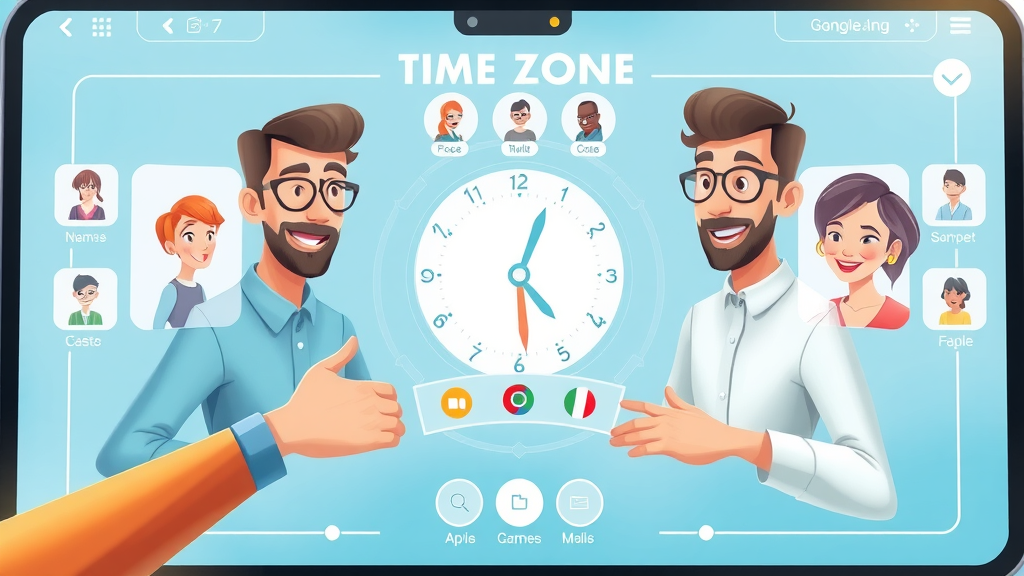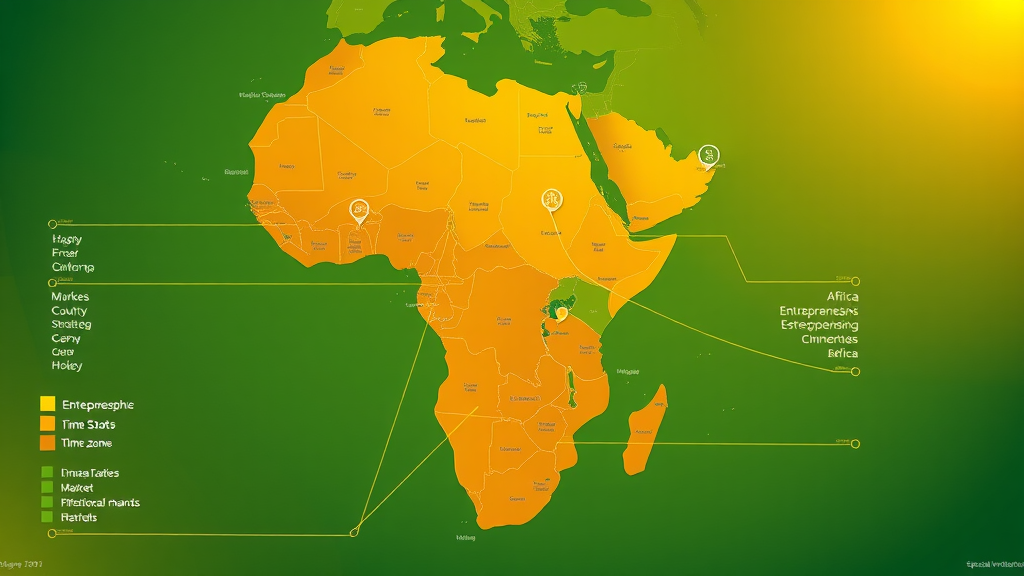Did you know that over 60% of Africa’s fastest-growing startups rely on remote international teams to scale their market reach—making time zone management a key business imperative?

-
Why time zone awareness is a driving force behind successful global market strategy for African entrepreneurs
-
How practical strategies for African entrepreneurs working with international clients and teams can boost productivity and client satisfaction
-
Real-world examples from African entrepreneurs navigating cross-continental challenges
-
Frameworks and tools to systematize time ownership and collaboration across continents
-
Insights into developing an Africa-centric approach to international business efficiency
Practical Strategies for African Entrepreneurs Working With International Clients and Teams: Understanding the Global Time Zone Challenge

African entrepreneurs face a unique set of challenges when working with international clients and teams, and one of the most prominent is managing collaboration across multiple global time zones . As Africa’s business landscape rapidly connects with the rest of the world, entrepreneurs must adapt their market strategy to fit complex scheduling and communication patterns. For example, a software startup in Lagos might find its developers in Kenya, its design partners in Eastern Europe, and its primary clients in North America—a reality that makes effective time zone management essential for delivering great experiences and maintaining competitive customer service.
The impact is clear: without a practical framework for coordinating meetings, task timelines, and customer support across continents, even the most promising African entrepreneurs risk losing productivity, missing deadlines, and failing to make decisions at the pace international clients expect. Leading startups now view time ownership as a core business model driver—implementing the right processes and tools to align their teams, regardless of physical borders. The African context is not a barrier but an asset, especially when entrepreneurs harness their local insight and blend it with global best practices.
The Importance of Practical Strategies for African Entrepreneurs in International Collaboration
Embracing practical strategies for African entrepreneurs working with international clients and teams sets successful businesses apart. These strategies empower African startups to compete globally by creating streamlined workflows and seizing growth opportunities in diverse markets. Using shared digital platforms and market-driven tools, leading entrepreneurs ensure rapid, clear communication that is tailored to the African and international context alike. This supports not only business efficiency but also sustainable team morale, making it possible to access top talent and deliver world-class customer service.
In the real market, African entrepreneurs have begun to prioritize strategies that bridge the time gap, such as establishing fixed weekly project updates and clear asynchronous feedback loops. An agile coach might oversee a software rollout from Cape Town while collaborating with North American partners—each side aligning meeting times that respect time zone differences and maximize productivity. Ultimately, these practical strategies turn potential barriers into strengths, opening doors for more African enterprises to thrive internationally.
Time Zone Barriers for African Entrepreneurs: Key Obstacles and Their Impact on Business

Time zone differences pose several significant obstacles for African entrepreneurs striving for a global presence. First, scheduling conflicts often affect team collaboration, with overlapping working hours limited between Africa and markets such as North America or Asia. This reduces opportunities for real-time communication, which can delay decisions and slow progress on critical projects. It’s not uncommon for African teams to hold late-night or early-morning calls, impacting both productivity and work-life balance.
Secondly, customer service and project delivery can be hampered when client and team hours do not align. Delayed responses can affect customer satisfaction, causing friction and lowering the perceived reliability of African entrepreneurs. There’s also the challenge of harmonizing business processes—especially for startups that need agile workflows and must adapt rapidly to changing international trends. These time barriers require practical strategies, such as leveraging development partner networks and advanced scheduling tools, to maintain a competitive edge.
"Effective time ownership enables African entrepreneurs to transform time zone challenges into growth opportunities." – Global Business Solutions Expert
Building a Sound Market Strategy: Prioritizing Time Ownership for African Entrepreneurs

Market Strategy for Global Success: Lessons from South Africa and Beyond
South Africa stands as a prime case study for market strategy success among African entrepreneurs, particularly those who have mastered practical strategies for international engagement. Leveraging lessons from South African businesses, entrepreneurs across the continent are encouraged to build resilient business models that can withstand the unpredictability of global time differences. South African companies commonly employ agile methodologies, robust digital communication platforms, and results-driven project management styles to stay efficient.
By focusing on building clear communication pipelines, African entrepreneurs ensure key stakeholders remain informed, regardless of location or time. Tools like Slack, Zoom, and Asana, for instance, help African teams make decisions quickly and keep projects on track. The end result is a business strategy that is both scalable and adaptable, suitable for diverse markets from Lagos to London and beyond.
Establishing Effective Communication Protocols With International Clients and Teams
Strong communication protocols are vital for managing global teams and clients. African entrepreneurs should outline meeting schedules that rotate time slots, ensuring all stakeholders shoulder the burden of after-hours calls fairly. Protocols should include standard response times for emails and messages, clear escalation paths for urgent issues, and documented processes for knowledge transfer—especially when teams work asynchronously.
For customer service, responsiveness can be enhanced by structuring shifts to overlap with clients’ time zones or deploying automation (like chatbots) to maintain coverage. Regular digital check-ins help build trust and transparency, key in markets where reputation is everything. By standardizing these practices, African entrepreneurs cement their reputation as reliable international partners and ensure customer satisfaction remains high.
|
|
|
|
|
Comparison of Time Zone Tools Used by Top African Entrepreneurs |
|
Tool |
Features |
Integrations |
Pros |
Cons |
|---|---|---|---|---|
|
World Time Buddy |
Time conversion, group scheduling, event notifications |
Google Calendar, Outlook |
Intuitive interface, fast setup |
Limited free features |
|
Calendly |
Automated booking, real-time time zone detection |
Zoom, Slack, MS Teams |
Saves time, easy for clients |
Paid plans needed for advanced features |
|
Clockify |
Time tracking, reporting, team scheduling |
Asana, Trello, Jira |
Great for teams, real-time updates |
Steep learning curve for new users |
|
Google Calendar |
Event reminders, multi-time zone support |
Mobile and desktop sync, email |
Widely accessible, free |
Less specialized for time zones |

Africa’s Leading Tools for Managing Time Zones: Technology Recommendations
Technology is the linchpin for Africans striving to excel in international markets. Leading tools—including World Time Buddy, Google Calendar, and Slack—provide seamless integration between time zones, ensuring all stakeholders remain aligned. South African startups have also adopted workflow automation platforms that track project progress in real time, regardless of continent. This technology-first mentality enhances collaboration, minimizes scheduling errors, and optimizes resource allocation across markets.
Adopting both African and international platforms allows entrepreneurs to bridge regional gaps with local insight and global reach. For example, integrating a payment gateway tailored to the African markets with time-based invoicing can streamline operations and appease global clients expecting efficiency. Ultimately, these tools foster an agile, adaptable, and globally competitive business model.
Role of Development Partners in Enhancing Practical Strategies for African Entrepreneurs Working With International Clients and Teams

How African Entrepreneurs Can Leverage Development Partner Networks Globally
Building relationships with development partners is a proven way for African entrepreneurs to accelerate global growth. Development partners—ranging from donor agencies to multilateral institutions and private sector collaborators—offer access to knowledge, capital, and resources not always available within the African context. These partners can facilitate introductions to global clients, mentor startups on international best practices, and provide solutions for complex regulatory and time management challenges.
For instance, South African businesses often leverage networks from the UK, EU, and North America to test business models, improve operational agility, and attract top talent. The exchange of ideas and resources with development partners gives African entrepreneurs a tactical edge, allowing them to respond swiftly to shifting market conditions and unlock economic empowerment on a global scale.
Case Study: South Africa’s Collaborative Approach to International Time Zone Management
South Africa’s entrepreneurs provide some of the region’s best case studies for international time zone mastery. In Johannesburg, a successful startup specializing in financial services implemented a rotating meeting schedule to ensure fair participation from international clients and remote team members. Utilizing automated scheduling apps and local insight into African markets, the company reduced project delays and enhanced customer satisfaction.
The business also formed strategic alliances with development partners, enabling it to enter North American and European markets without losing its African identity. This collaborative model highlights how practical strategies—tailored to the African but informed by global trends—can build a robust, adaptive, and globally respected brand.
Top Practical Strategies for African Entrepreneurs Working With International Clients and Teams

Leveraging Market Strategy Insights for Cross-Border Success
African entrepreneurs who excel internationally do so by applying market strategy insights that fit both local and global contexts. Success starts with taking ownership of time and mastering the art of cross-border collaboration. This means integrating technology, refining workflows, and establishing a culture where every team member understands the value of time and communication.
Including insights from agile coaches and mentors, these entrepreneurs cultivate a results-oriented culture. They frequently review performance, encourage asynchronous communication, and use tools such as shared digital workspaces to ensure seamless handovers. By documenting cross-continent workflows and setting clear expectations, they safeguard business continuity even when working across short time windows or non-overlapping hours.
-
Set fixed meeting windows using shared calendars
-
Adopt asynchronous communication methods
-
Use collaborative digital workspaces
-
Schedule regular review checkpoints
-
Deploy best-in-class time zone management apps
-
Cultivate a results-focused team culture
-
Document cross-continent workflows

"The future of African entrepreneurship lies in mastering practical strategies for working with international clients and teams."
Country Insights: Time Zone and Market Strategy Trends in South Africa and Other African Nations

How South Africa Is Shaping the African Entrepreneur Landscape in International Markets
South Africa continues to set the benchmark for other African nations looking to make international inroads. The country combines access to capital, advanced digital infrastructure, and a strong regulatory environment with a culture that encourages entrepreneurship. Cape Town, Johannesburg, and Durban are hubs for financial services, fintech innovation, and scalable startups serving both African and international customers.
With a focus on proactive customer service, tailored solutions, and robust development partner relationships, South African entrepreneurs quickly adapt to global trends, bringing the continent’s top talent into new markets. Their strategies are designed for flexibility, enabling rapid scaling or pivots when market conditions shift—an approach increasingly adopted by growing businesses in Kenya, Nigeria, and Rwanda.
Comparing Practical Strategies for African Entrepreneurs by Country
Beyond South Africa, countries like Nigeria, Kenya, and Rwanda have demonstrated unique approaches to international collaboration. Nigerian startups blend local insight with aggressive market expansion, often leveraging diasporic networks and tech-savvy workforce. Kenyan enterprises, driven by innovations in mobile payments and customer-centric financial services, have rapidly gained global traction.
Rwandan startups, while emerging, have differentiated themselves through government-backed incubators and a focus on building robust, exportable business models. While each market has distinct challenges—be it regulatory hurdles or payment gateway integration—the use of practical strategies for working with international clients and teams remains a common denominator across Africa’s most successful startups.
|
|
|
|
African Countries With the Most Supportive Environments for Entrepreneurship |
|
Country |
Time Zone Alignment |
Business Policy |
Market Strategy Potential |
|---|---|---|---|
|
South Africa |
Favorable with Europe |
Strong support, funding access |
High—proven record in fintech, startups |
|
Nigeria |
Central to global clients |
Emerging regulations, large market |
High—tech, agribusiness innovation |
|
Kenya |
Overlap with Middle East/Asia |
Government support, incubators |
Strong—mobile payments, digital |
|
Rwanda |
Syncs with Africa/MENA |
Stable, entrepreneur-friendly |
Growth—services, export models |

Frequently Asked Questions for African Entrepreneurs About International Business and Time Zones
What is the Africa strategy of business?
The Africa strategy of business refers to how organizations and African entrepreneurs tailor their practical strategies to leverage local market opportunities, optimize operations across multiple time zones, address regional business policy challenges, and build strong development partner networks for scalable international growth.
Which African country encourages entrepreneurship the most?
South Africa is widely recognized for encouraging entrepreneurship, thanks to its robust market strategy, strong support systems, access to development partners, and a regulatory framework conducive to business growth. However, countries like Nigeria, Kenya, and Rwanda are also emerging as dynamic hubs for African entrepreneurs.
What is the best business to start in Africa?
The best business for African entrepreneurs depends on market needs and international demand, but sectors such as technology, agribusiness, fintech, renewable energy, and e-commerce have shown significant potential for success using practical strategies for global clientele and teams.
Is Africa a good place for business?
Yes, Africa offers increasing opportunities for entrepreneurs due to a growing population, digital transformation, and expanding international partnerships. African entrepreneurs who apply practical strategies for working with international clients and teams can capitalize on these dynamic markets despite time zone challenges.
Key Takeaways for African Entrepreneurs Working With International Clients and Teams
-
Time zone mastery is a catalyst for African entrepreneurship success
-
Practical strategies ensure sustainable cross-continental operations
-
Strong market strategy and development partner relationships drive international growth
-
Technology tools and collaboration frameworks are essential for time ownership
-
Embracing time zone diversity leads to adaptive, world-ready teams

Empower Your Global Ambitions: Take the Next Step With Proven Practical Strategies for African Entrepreneurs
Ready to expand your business across continents? Embrace practical strategies for African entrepreneurs working with international clients and teams —boost your international growth, build resilient cross-border teams, and take ownership of your time to unlock global success.
 Add Row
Add Row  Add
Add 




Write A Comment